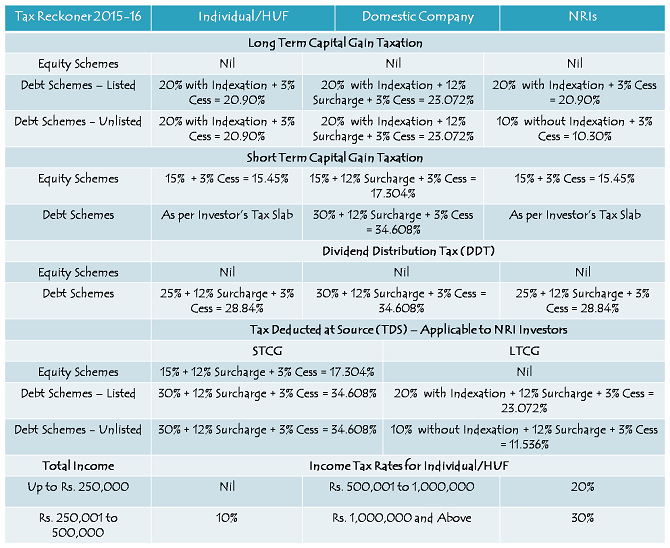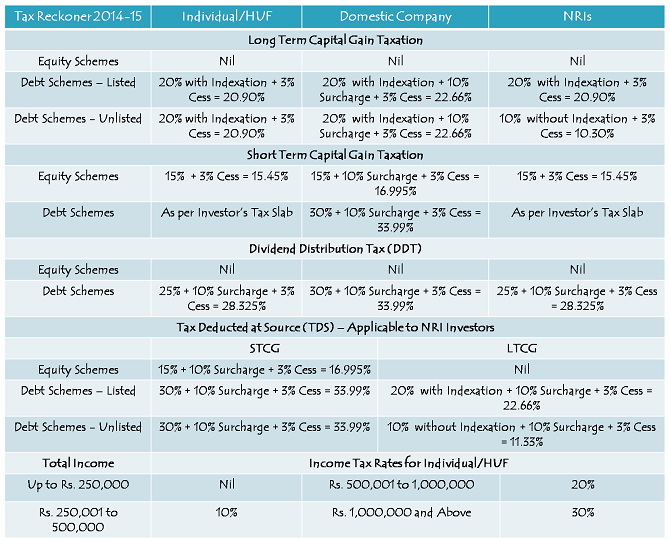This post is written by Shiv Kukreja, who is a Certified Financial Planner and runs a financial planning firm, Ojas Capital in Delhi/NCR. He can be reached at skukreja@investitude.co.in
With stock markets rising by 35-40% and bond markets giving 15-20% returns in the last one year or so, mutual fund investments are gaining popularity. More and more people are now recognising mutual funds as a highly efficient vehicle to ride with the pace of corporate profitability and Indian economic growth. What makes mutual funds more attractive is their taxation treatment.
While selling equity mutual funds after holding for more than 12 months makes long term capital gains tax-free, selling non-equity mutual funds after 36 months provides indexation benefits, which make them extremely tax efficient vis-a-vis fixed deposits or post office small saving schemes. Short term capital gains on equity mutual funds are also taxed at a lower rate of 15%. Moreover, dividend received is also tax exempt in the hands of mutual fund investors.
Last year in July, the Finance Minister, Mr. Arun Jaitley increased the holding period of debt mutual funds from 12 months to 36 months for these funds to quality as long-term capital asset. Though Budget 2015 has not tinkered with the tax rates applicable to mutual fund investments, some changes have been proposed as far as surcharge is concerned for high net worth individuals and domestic companies.
Mutual Fund Taxation for Individuals/HUFs
Equity Mutual Funds – Units of equity mutual funds held for more than 12 months qualify as long-term capital asset and long term capital gains (LTCG) on equity mutual funds are tax-free or exempt from tax, while short term capital gains on equity mutual funds are taxed at 15%.
Non-Equity Mutual Funds – Units of non-equity mutual funds held for more than 36 months qualify as long-term capital asset and long term capital gains (LTCG) on non-equity mutual funds are taxed at 20% with indexation, while short term capital gains on non-equity mutual funds are taxed as per the slab rate of the individual/HUF investor.
Dividend Income – Dividend income is tax-free or exempt from tax in the hands of individual/HUF investors. Dividend Distribution Tax (DDT), which is applicable to non-equity schemes only, is paid by the mutual fund/asset management company.
Tax Reckoner Financial Year 2015-16
Some Important Points:
- Surcharge at the rate of 12% will be applicable to Individuals/HUFs having total income exceeding Rs. 1 crore.
- Surcharge at the rate of 12% will be applicable to the domestic companies where the income exceeds Rs. 10 crore. Where income exceeds Rs. 1 crore but is less than Rs. 10 crore, surcharge of 7% will be applicable.
- In order to qualify as long-term capital asset, the units of mutual funds (other than units of equity oriented funds) should be held for a period of more than 36 months. In the case of equity oriented funds, the units would qualify as long-term capital assets if held for more than 12 months.
- In cases where the taxable income, reduced by the taxable long term capital gains of a resident individual/HUF is below the basic exemption limit, the long term capital gain will be reduced to the extent of this shortfall and only the balance of the long term capital gain is chargeable to income tax. The benefits of this provision are not available to NRIs.
- For the purposes of determining the dividend distribution tax payable, the amount of distributed income shall be increased to such amount as would, after reduction of the dividend distribution tax on such increased amount at the specified tax rates, be equal to the amount of income distributed by the Mutual Fund.
- Rebate of up to Rs. 2,000 available for resident individuals whose total income does not exceed Rs. 500,000.
- (i) In the case of a resident individual of the age of 60 years or more but less than 80 years, the basic exemption limit is Rs. 300,000.
(ii) In the case of a resident individual of the age of 80 years or more, the basic exemption limit is Rs. 500,000.
(iii) Education cess is applicable at the rate of 2% on income-tax and secondary and higher education cess at the rate of 1% on income-tax.
Note: The rates above are based on the proposals in the Finance Bill, 2015. They will become a law once passed by both the Houses of Parliament and when they receive the assent of the President.
Tax Reckoner Financial Year 2014-15
Mutual funds, especially equity mutual funds, are the most tax efficient investment options for investors here in India. But, due to market volatility, most resident individual investors remain skeptical about it. I think they need to understand that it is their wrong timings of entry and exit which make them suffer losses in these funds. If they invest when the markets are down due to overly negative sentiments and sell when the markets are up due to euphoric sentiments, then I think they should be able to earn reasonably higher returns.
If you have any general query regarding mutual fund investments or their taxation treatment, please share it share.



Dear Sir,
Please advise with effect from which date in FY 2015-16 will the sale of debt funds, held for less than 3 years, attract STCG.
Will units sold after 01 Apr 2015 but before the date the finance bill received assent be treated as per tax treatment applicable to debt funds in the previous financial year?
Thanks.
P Mandal.
Hi to you,
Is switching from debt to equity fund prior to 36 months also taxable?
Regards
Hari
Consider asking the mutual fund involved to issue a capital gains statement for the financial year in which the switch from debt to equity fund took place. The matter will be clarified officially.
Hello Shiv,
Very informative article and useful as handy reference during IT return submission time !! I hope you will come up with an article updated for FY 2016-17 soon 🙂 .
Hi Shiv,
I understand that if I sell my debt funds before a period of 36 months, I will be paying Short Term Capital Gain tax.. Though, I am just wondering if the same taxation will be applicable even when I am switching to some Equity fund from Debt fund. I believe it’s the same as selling the debt fund and tax would be applicable. Though, it would be great if you can confirm. Thanks for your help.
Regards,
Arun
Can u please consider my situation:
I have only salary income. I had invested in equity mutual funds which i redeemed in 2014-15 and thus have long term capital loss. What will be its treatment in calculating income tax??
I pay an annual tax of Rs. 250000+, please advise me on tax saving other than 8th schemes. If you can give your contact details, so that I can get in touch with you personally.
Hi
Say, ‘X’ is employed in the US for a project for a period of 2-3 years and he invests in Indian mutual funds during this time.Say, he comes back to India after 3 years and sells his mutual fund after 5 years, at which time he is not an NRI. Would he be liable to pay any tax to the US govt ?
Thanks in advance.
Hi Manika,
I am not sure about it, but I don’t think the investor would be required to pay any tax on this transaction to the US tax authorities.
Hi,
In the two Tax Reckoner tables, under TDS for STCG and LTCG of funds, you note the TDS with indexation rate (and above -Applicable to NRIs). However, my understanding is that NRIs can NOT take advantage of indexation benefits on LTCGs? Has that changed for FY 2014-2014 or the year after?
Thanks
Annie
Hi Annie,
Indexation benefit is available to the NRIs on non-equity mutual fund investments.
Shiv,
Whether Tax Free Bonds will be launched this month? Earlier they were launching it in 2nd half of the FY. It seems they will be available earlier this time.
http://economictimes.indiatimes.com/news/economy/finance/finance-ministry-nod-for-tax-free-bonds-by-railways-highways/articleshow/46855367.cms
Not sure Amit. It is just a nod given to these two sectors. When do companies like NHAI, IRFC etc. come out with such issues is still not clear.
Hi Shiv,
Could you also provide details on how taxation is done for Gold ETFs?
Hi Anil,
Tax treatment for Gold ETFs is same as it is for Listed Debt Funds.
I have a request although it might be difficult to answer. Do you happen to know the short term and long term capital gains tax rates for equity/debt investments made by an Indian resident/citizen outside India? Or, is it possible to point me to the relevant sections of the IT laws regarding this? I’ve not been able to locate the IT laws for this, or any website which provides a tax reckoner for this. Also, I am trying to find out how forex variations are to be accounted for when calculating capital gains for investments made overseas. Thanks. I don’t want to have to go to a CA just for this. 🙂
No Shaviv, we do not have any such tax reckoner. I think different countries have different taxation rules, so I don’t think anybody would have tried to make it for Indian Residents. Also, I think you’ll have to consult your CA only for the traetment of forex gains/losses for an individual investor.
ok, thanks for the response anyway. I thought it might be worth a try to ask. By the way, I don’t think the rules would be different on a per country basis as I’m pretty sure IT dept would treat equity gains in US vs UK vs Singapore (for example) the same for an Indian citizen+resident… but anyway, I’ll have to check. Thanks.
Hi Shiv,
Can you throw some light on the REC OFS opening tomorrow 8th Apr?
Eagerly waiting for your guidance on this issue.
Regards,
SB
Hi SB,
Working on it, I think I should be able to post it by late tonight.
Hi Shiv,
Can you please share a calculation showing how much return will be impacted from this tax rule changes in case of Mutual Fund investment?
Hi Santanu,
I don’t think there will be any meaningful impact on one’s returns due to these tax changes. But, I’ll still try to check if it makes sense to do a post on that.
Hi Shiv. I just read that it would be a good idea to invest in liquid funds or short term debt funds. But for a person where liquidity is not a concern I think directly investing in equity Mutual funds would be the way too go. Am I right? Secondly, I am in the process of liquidating all my stocks and all my previous Mutual fund holdings and intend doing so over the next month or so or maybe a bit longer. I aim to reinvest all the amount totaling to about 15 lakh in new selected Mutual funds. Not more than 5 or maximum 6. How should I go about it? Should I park the funds in a liquid or short term debt fund and do an STP or …? What do you suggest? Also any ideas for the new funds? My profile – Don’t mind risk but not too much. Long horizon. Regards